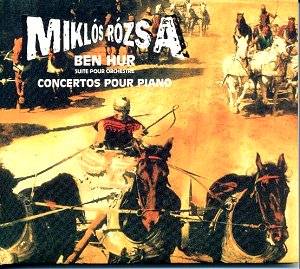Miklós RÓZSA
Ben-Hur Suite; Spellbound Concerto; Concerto for Piano
and Orchestra
 Danielle Laval (piano); Northern
Hungarian Symphony Orchestra, Miskolc Conducted by László
Kovács
Danielle Laval (piano); Northern
Hungarian Symphony Orchestra, Miskolc Conducted by László
Kovács
 VALOIS AUVIDIS (naïve)
V 4841 [63:01]
VALOIS AUVIDIS (naïve)
V 4841 [63:01]
Purchase from:
Crotchet
Amazon
UK

Based on his own score for the 1945 Alfred Hitchcock production,
Rózsa’s Spellbound concerto starts out as unequivocally
romantic and yet because the story of the film centred around the lead
character’s psychosis, an underlying darker tone gradually takes precedence
and by the mid-way point we have truly descended into the heart of darkness.
For me this is by far the best section of the piece, as it perfectly conjures
the discord that can sometimes seize the human mind. The more routine romanticism
that bookends it is less interesting however, although the finale itself
stands up rather well.
The highlight of this CD though is unquestionably the suite from the multi-Oscar
winning Ben Hur (including best score for Rózsa himself). Opening
with the stunning ‘Prelude’, this is a rousing, majestic incorporation
of the main themes from the film and in particular introduces the ‘Love
Theme’ that is then expanded and given a fuller rendition in the next
cue. A truly beautiful, emotional melody for strings and woodwind, this ranks
as one of the great themes of cinema.
The next two pieces ‘Rowing of the Galley Slaves’ and ‘The
Burning Desert’ drive along with a pounding urgency and are as fine
an example of dramatic film music from this era as you are likely to hear.
And when you think you have heard the best ‘The Mother’s Love’
proves beyond question what an incredible talent Rózsa really was
with a heart-rending theme of real tenderness.
Finally ‘Parade of the Charioteers’ demonstrates his skill with
fanfares, something that has been proven time and time again by his work
on such historical blockbusters as Quo Vadis, King of Kings and
El Cid. In fact, it could be argued that Rosza is the very voice of the
movie epic. His sound and style have now become a part of our musical and
cinematic consciousness.
Alongside his contemporary Bernard Herrmann, Miklos Rozsa was one of the
true godfathers of film music, in the sense that his greatest work remains
both timeless and influential. There is no sense of a style that has become
outmoded or unsophisticated. Instead it sounds as fresh and original as it
did when first heard.
To conclude the CD, Rózsa’s ‘Opus 31’, a work
commissioned by pianist Leonard Pennario and completed in 1966, is given
a full-blooded interpretation and makes a very interesting companion to his
music written especially for film.
Made up of three movements, the first is the dark and dangerous ‘Allegro
Energico’ with dissonant piano that is as intense as anything you are
likely to find in his film work. Actually, this is similar to
‘Spellbound’ as it also evokes a sense of some troubled inner conflict.
‘Adagio’ features oboe and piano working together to bring to life
a gentler theme, although there is still a sense of unrest with strings taking
a firmer hold mid way through, before the piano is finally given its head
in strident, incisive manner. This then subsides, fading out with genteel
simplicity.
The tempo quickens with ‘Vigoroso’, the percussive and xylophone
backing used to good effect. A number of different instruments take brief
centre stage to create a mosaic of sound and although there are some respites,
the tempo becomes steadily more manic, galloping on towards an almost frenzied
conclusion.
For any established Rósza admirer this would appear to be a must-have.
But also for those who have yet to discover this outstanding composer, this
seems a very good place to start.
I suppose if there was a fault to be found with this collection it might
be that for those who have more modern sensibilities, the two concertos are
a little dense and demanding. But for those with an appreciation of more
classical work or simply those looking to sample a taste of one the greatest
film composers of the last century, they will certainly be in for a treat.
Reviewer
Mark Hockley

Ian Lace adds:-
The interest in this 1998 recording is that the orchestra is Hugarian
(Rózsa was born in Budapest).
Their performance of this six-movement Ben-Hur Suite is generally
very good; the majestic Prelude with those magnificent themes resounding
splendidly. Kovács delivers a brilliant finale in which the ‘Parade
of the Chariotteer’ fanfares really reach out and grasp you, and then
there is a marvellously brutal ‘Rowing of the Galley Slaves’ with
its accelerating cross-rhythms. The ‘Love Theme’ is sweetly eloquent
too and ‘The Burning Desert’ nicely scorching, with that beatific
music, most affecting, for the sequence where Jesus brings water to Ben-Hur.
The glamorous Danielle Laval attacks the bravura passages in the
Spellbound concerto like a tigress and caresses the more delicate
figures that end the Adagio of the Piano Concerto. Kovács eshews the
theremin in the Spellbound concerto, opting for the same effect using
brass and strings. This is a strong and enjoyable interpretation, full of
romantic passion, if a little coarse-grained and wayward at times. The Piano
Concerto fares even better. This is strong, diamond hard music more reminiscent
of Rózsa’s film noire scores but with the more tender episodes
very much akin to the Spellbound music.
Reviewer
Ian Lace

![]()
![]()
![]()
![]()
![]()
![]()
![]()
![]()
![]()
![]()
![]()
![]()
![]()
![]()
![]()
![]()